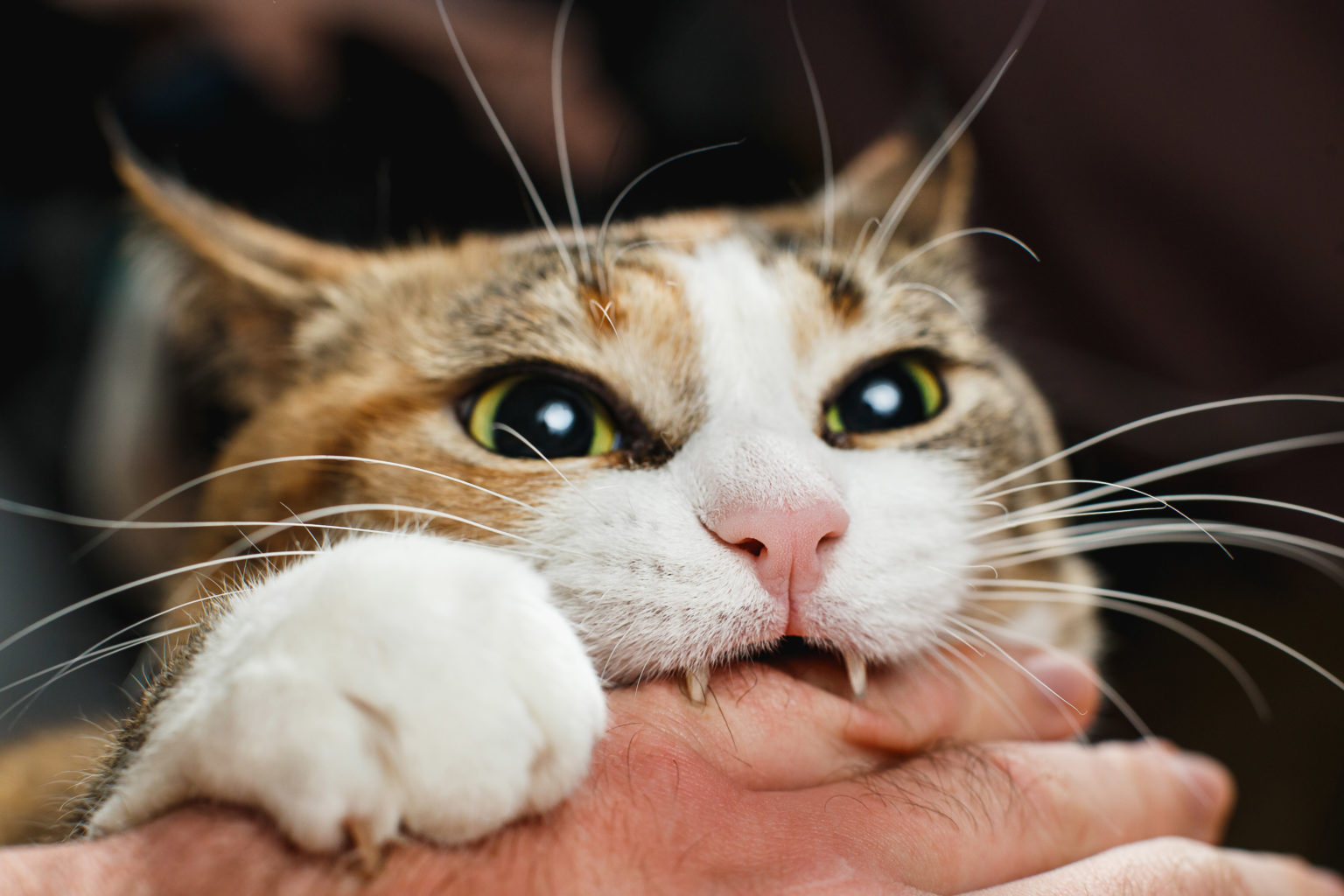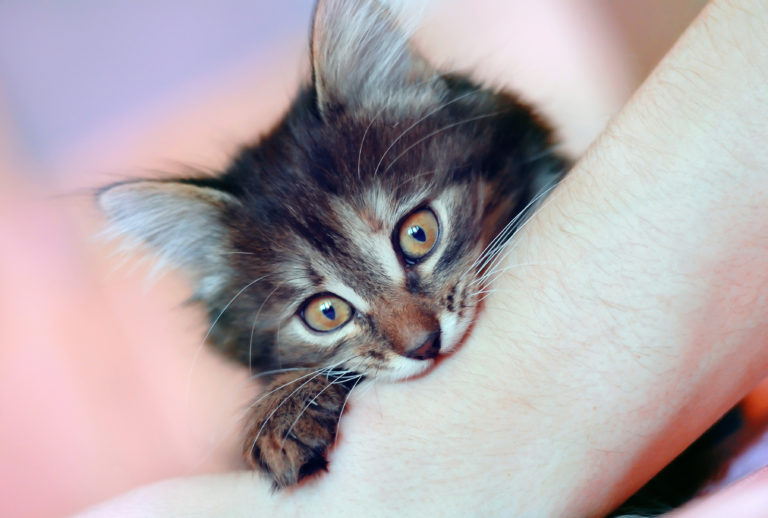Cats can be difficult little creatures. They’re practically unintelligible for non-cat people. But even for their owners, cats are still confusing sometimes.
Biting is a universal part of cat language with multiple meanings. Is it bad? Is it just playful? Honestly, it depends!
A dog that bites out of the blue – either unprovoked or while stressed – is a problem. But cat bite usually isn’t launching into a full-frontal attack. So, why do cats bite their owners for no reason? Let’s explore a few reasons and a few ways you can scale it back.
Why Does My Cat Bite Me?

In short, it’s usually to communicate something. Not always, however — if you’re in the midst of play, for example, your cat may bite simply because you’re the prey it’s hunting. There’s also overstimulation, which is a communication of a straightforward and simple message:
- That’s just your cat trying to communicate, OK, I’ve had enough.
- Ever think to yourself, why does my cat bite me unprovoked when we’re having a nice time? Perhaps you’ve been petting them, or they’ve been licking your hand. Then suddenly, the little kitty is all teeth.
- That’s an abrupt escalation, but you can learn to anticipate and preempt it (look for tail swishes, a decrease in purring, ears going a little sideways). It’s a natural response you’ll find in cat-to-cat interactions, too, though. It merely means, please withdraw now. I don’t want together-time for the moment. Respect it for the best results.
Besides play and overstimulation, we can break bites down into several broad categories: age, aggression, attention, and affection.
Why do kittens bite?
Kittens are biters.
- They’re playing and learning; it’s just how they interact with the world. Kittens know not what they do with the tiny knives in their mouths and toes.
- Kitten biting is normal and not to be discouraged per se. Your kitten will naturally grow out of most painfully playful tendencies.
- Just don’t let them nibble on fingers, toes, and the like — redirect with a toy. This should significantly cut down on your then-adult cat biting you in the future while playing.
Has your older cat suddenly developed a biting problem?
- It may be a sign of pain or other problems such as lost sight or hearing. If they can’t tell you’re coming, they might be startled and go for a quick self-defense move.
- Certainly, your old cat may have just grown a little more crotchety in their old age. Being old isn’t a walk in the kitty park. However, increased aggression can signal specific health problems, so it’s best to bring them in for a check-up.
Cat Aggression
There are two sides to an aggressive bite.
Your cat may be trying to get its way (sort of through intimidation):
- They know biting can be painful and is generally a no-no. They might bite at you to make you stop doing something, like clipping their nails or putting them into a carrier.
- It’s important to discourage the cat’s behavior by continuing — let them know a bite will not result in them getting what they want.
- This differs from overstimulation in that it’ll be something your cat does not want, rather than something they generally enjoy but are done with for the moment.
A true aggressive bite happens in response to a perceived threat.
- Your cat is angry, frustrated, or afraid and lashing out. It will probably be accompanied by hissing, growling, or spitting. Maybe a little yowling.
- A genuinely aggressive bite, if you’re the recipient, will be obvious — you’re going to take some damage, and you’ll have to treat the wound. But if it’s a cat you know and trust, try not to panic and don’t respond aggressively, as it’ll encourage them to dig in and continue the “fight.”
- However, you should try to extricate yourself and leave the cat alone. A simple intimidation tactic may progress towards this in some situations — by then it’s best not to continue.
Attention
Ever ask yourself, “Why does my cat bite me gently?” Perhaps a little nibble followed by a meow or scampering away, tail held high, while looking back at you?
If it doesn’t break the skin and it seems like your cat wants something, they’re just biting you so that you’ll pay attention to them. They’re like your friend balling up paper to throw at your head from the other side of the classroom.
Affection
Why do cats purr and then bite you? Well, are they still purring? If it doesn’t break the skin and your cat just gazes up at your adoringly, or starts kneading you, or was kneading you, and then started licking and finally gave a little bite, that kitty is in love.
It’s all a bit reminiscent of their kitten days with mama, where bonding through kneading, licks, and nibbles happened a lot. In a way, it’s still a bid for attention. They might want you to be a more active participant in the bonding and may give a little nip to encourage you.
How to Stop a Cat From Biting

- Unfortunately for us, cats learn through consistency. You can’t teach them that bonding bites are cute and good while biting to be fed isn’t. The lesson they have to learn is that all biting of humans is bad.
- Scolding and punishment will be counterintuitive. It won’t teach your cat anything; it will make them angry at worst or somewhat confused as to what’s happening. Instead, work with the tools of redirection and positive reinforcement.
- If your cat nips for attention, be sure to ignore them. When they try to get your attention in other ways, without biting you, reward them and see what else they wanted.
- Don’t respond to nibbles at bonding time – don’t give in and start petting, but also don’t pull your hand or arm away while the love bite is happening. They may take it as an invitation to give chase; simply move out of the line of fire afterward.
- As mentioned above, if your cat bites to make you stop doing something, just keep on. Otherwise, you’re letting them know that biting is an effective tactic against you. Then they would repeat the behavior later. Make sure you praise them and offer treats when the ordeal is over.
- Finally, if you have an aggressive biter, you should stay conscious of what sets them off and prevent the situation entirely. Once they’re on the warpath, you can’t do much but back off or try to redirect them safely.
Takeaway
Why do cats bite? The reason can seem elusive, but there’s always an explanation. Once you learn the why behind your cat’s biting, you can begin convincing them why not.
Just remember that it’ll take patience and repetition. And sometimes, even the most well-behaved cat breeds might give in to instinct.
